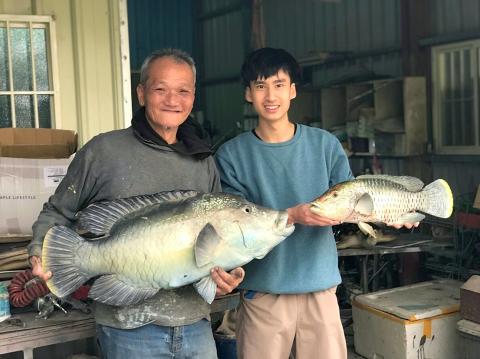A senior high-school student in Keelung has developed a way to harness the energy produced by fish as they swim.
Chen Huai-pu (陳懷璞), who has grown up spending lots of time around the ocean, said the idea came to him as he was snorkeling one day.
Noticing how quickly fish move, he wondered if the energy their movements produced could be captured and stored, he said.

Photo courtesy of Anle Senior High School
Under the guidance of one of his teachers at Anle Senior High School, Chen developed a small device that can be attached to a fish’s body to generate electricity.
Chen said that he used a 3D printer to produce a Venturi tube — a tube with a constricted section that decreases the pressure of fluids flowing through it at the same time the velocity of the fluid is increased — which allowed him to measure the speed of water flow, and thus determine the amount of potential energy that would be produced by the flow.
A series of experiments confirmed his hypothesis that electricity could be produced by the movement of fish, he said.
The potential 20-year lifespan of his device would be far better than the average lifespan of conventional batteries, he said.
His invention won first place at a recent science and engineering competition in Taiwan, and in May, he is scheduled present it at a technology symposium in the US.
Chen, who has been working with his teachers to improve his English ahead of his trip to the US, said he is very interested in interdisciplinary studies and combining ideas from different fields.
Marine scientist Chiang Wei-chuan (江偉全) said Chen’s device could potentially slash the cost of seafloor research surveys.
At present, conducting such surveys has to be done by ship-based researchers, and the costs of such projects can easily top NT$10 million (US$324,359), he said.
However, Chen’s fish-mounted micro generators could be used in an application that would allow a survey of the seafloor through the movement of fish, which would drastically reduce such costs, the scientst said.
Once mass-produced, the per unit cost of Chen’s device could be as little as NT$5,000, Chiang said.

Costa Rica sent a group of intelligence officials to Taiwan for a short-term training program, the first time the Central American country has done so since the countries ended official diplomatic relations in 2007, a Costa Rican media outlet reported last week. Five officials from the Costa Rican Directorate of Intelligence and Security last month spent 23 days in Taipei undergoing a series of training sessions focused on national security, La Nacion reported on Friday, quoting unnamed sources. The Costa Rican government has not confirmed the report. The Chinese embassy in Costa Rica protested the news, saying in a statement issued the same

Taiwan’s Liu Ming-i, right, who also goes by the name Ray Liu, poses with a Chinese Taipei flag after winning the gold medal in the men’s physique 170cm competition at the International Fitness and Bodybuilding Federation Asian Championship in Ajman, United Arab Emirates, yesterday.

A year-long renovation of Taipei’s Bangka Park (艋舺公園) began yesterday, as city workers fenced off the site and cleared out belongings left by homeless residents who had been living there. Despite protests from displaced residents, a city official defended the government’s relocation efforts, saying transitional housing has been offered. The renovation of the park in Taipei’s Wanhua District (萬華), near Longshan Temple (龍山寺), began at 9am yesterday, as about 20 homeless people packed their belongings and left after being asked to move by city personnel. Among them was a 90-year-old woman surnamed Wang (王), who last week said that she had no plans

‘SPEY’ REACTION: Beijing said its Eastern Theater Command ‘organized troops to monitor and guard the entire process’ of a Taiwan Strait transit China sent 74 warplanes toward Taiwan between late Thursday and early yesterday, 61 of which crossed the median line in the Taiwan Strait. It was not clear why so many planes were scrambled, said the Ministry of National Defense, which tabulated the flights. The aircraft were sent in two separate tranches, the ministry said. The Ministry of Foreign Affairs on Thursday “confirmed and welcomed” a transit by the British Royal Navy’s HMS Spey, a River-class offshore patrol vessel, through the Taiwan Strait a day earlier. The ship’s transit “once again [reaffirmed the Strait’s] status as international waters,” the foreign ministry said. “Such transits by